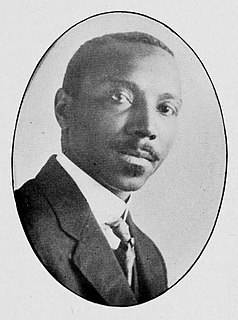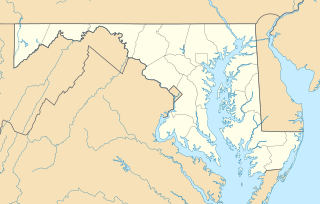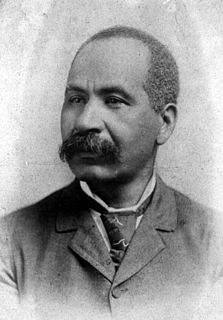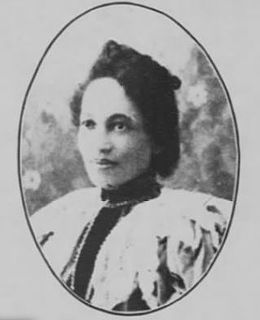Related Research Articles

Booker Taliaferro Washington was an American educator, author, orator, and adviser to multiple presidents of the United States. Between 1890 and 1915, Washington was the dominant leader in the African American community and of the contemporary black elite. Washington was from the last generation of black American leaders born into slavery and became the leading voice of the former slaves and their descendants. They were newly oppressed in the South by disenfranchisement and the Jim Crow discriminatory laws enacted in the post-Reconstruction Southern states in the late 19th and early 20th centuries.

Morgan State University is a public historically black research university in Baltimore, Maryland. It is the largest of Maryland's HBCUs. In 1867, the university, then known as the Centenary Biblical Institute, changed its name to Morgan College to honor Reverend Lyttleton Morgan, the first chairman of its board of trustees and a land donor to the college. It became a university in 1975. MSU is a member of Thurgood Marshall College Fund. Although a public institution, MSU is not part of the University System of Maryland. It is classified among "R2: Doctoral Universities – High research activity".

North Laurel is a census-designated place (CDP) in Howard County, Maryland, United States. The published population was 4,474 at the 2010 census. This population was substantially less than the CDP's population in 2000, and was the result of an error in defining the boundary prior to tabulation and publication of 2010 Census results. The corrected 2010 Census population is 20,259. North Laurel is adjacent to the City of Laurel, which is located across the Patuxent River in Prince George's County.

Laurel is a city in Maryland, United States, located almost midway between Washington and Baltimore on the banks of the Patuxent River. While the city limits are entirely in northern Prince George's County, outlying developments extend into Anne Arundel, Montgomery and Howard counties. Founded as a mill town in the early 19th century, Laurel expanded local industry and was later able to become an early commuter town for Washington and Baltimore workers following the arrival of the Baltimore and Ohio Railroad in 1835. Largely residential today, the city maintains a historic district centered on its Main Street, highlighting its industrial past.

Thomas Wyatt Turner was an American civil rights activist, biologist and educator. He was the first Black American to receive a PhD in Botany, and helped found both the NAACP and the Federated Colored Catholics.

A normal school is an institution created to train high school graduates to be teachers by educating them in the norms of pedagogy and curriculum. Most such schools, where they still exist, are now denominated "teacher-training colleges" or "teachers' colleges" and may be organized as part of a comprehensive university. Normal schools in the United States, Canada and Argentina trained teachers for primary schools, while in continental Europe, the equivalent colleges educated teachers for primary, secondary and tertiary schools.

The Baltimore Polytechnic Institute, colloquially referred to as BPI, Poly, and The Institute, is a U.S. public high school founded in 1883. Though established as an all-male manual trade / vocational school by the Baltimore City Council and the Baltimore City Public Schools, it is now a coeducational academic institution that emphasizes sciences, technology, engineering, and mathematics (STEM). It is located on a 53-acre (21 ha) tract of land in North Baltimore on the east bank of the Jones Falls stream which runs from the north near the "Mason–Dixon line" border between Maryland and Pennsylvania to the south emptying in the Northwest Branch of the lower Patapsco River/Inner Harbor between downtown and Fells Point. Also running parallel to the extensive Poly campus is the Jones Falls Expressway. The institute is located at the northwest intersection of Falls Road and West Cold Spring Lane, in northwestern Baltimore City, bordering the neighborhoods of Cross Keys to the north, Roland Park to the east, Hampden to the south, Woodberry to the southwest and I-83 /Jones Falls to the west and Park Heights and Pimlico further northwest. BPI and the adjacent Western High School are located on the same campus, share several amenities including a cafeteria, auditorium, center courtyard and athletic fields, as well as a collaborative marching band recently united, now known as the Marching Flock. BPI is a "Maryland Blue Ribbon School of Excellence" cited by the Maryland State Department of Education.
The Howard County Public School System (HCPSS) is the school district that manages the public schools of Howard County, Maryland. It is headquartered in the Columbia, Maryland census-designated place; the facility has an Ellicott City mailing address. It operates under the supervision of an elected, eight-member Board of Education. Dr. Chao Wu is the Chairman of the Board. Michael J. Martirano is the current Superintendent, replacing Renee Foose following her resignation in May 2017.

Carver Vocational-Technical High School - fully George Washington Carver Vocational-Technical High School - also known as Carver Vo-Tech is a public vocational-technical high school located in the western part of Baltimore, Maryland, United States and part of the Baltimore City Public Schools system.
Desegregation of the Baltimore City Public Schools took place in 1956 after the United States Supreme Court ruled, in the case of Brown v. Board of Education, that segregation in schools went against constitutional law. Desegregation of U.S. schools was part of the civil rights movement. The events that followed desegregation in Baltimore, were important to the civil rights movement across America. Recent scholarship has identified Baltimore's desegregation as an important precursor to the Greensboro sit-ins.
Rev. Don Speed Smith Goodloe, born in the Lowell community, near Paint Lick, Kentucky, was a black teacher who became a pioneer for racial integration in the Unitarian church. He was the first principal of the Maryland Normal and Industrial School at Bowie for the Training of Colored Youth, also known as Maryland State Normal School No. 3—which later became Bowie State University.

Maryland State Department of Education (MSDE) is a division of the state government of Maryland in the United States. The agency oversees public school districts, which are 24 local school systems — one for each of Maryland's 23 counties plus one for Baltimore City. Maryland has more than 1,400 public schools in 24 public school systems, with 2019 enrollment of approximately 900,000. Of the student body, 42% are on FARMS and 22% are Title 1.

Baltimore City Public Schools, also referred to as Baltimore City Public School System, BCPSS, BCPS and City Schools, is a public school district in the city of Baltimore, state of Maryland, United States. It serves the youth of Baltimore City. Traditionally however, the Baltimore City Public Schools system has usually never referred to itself as a "district," as the operation of the schools was synonymous with the city of Baltimore. Its headquarters are located on 200 East North Avenue at North Calvert Street in the "Dr. Alice G. Pinderhughes Administration Building".

The Bordentown School was a residential high school for African-American students, located in Bordentown in Burlington County, New Jersey, United States. Operated for most of the time as a publicly financed co-ed boarding school for African-American children, it was known as the "Tuskegee of the North" for its adoption of many of the educational practices first developed at the Tuskegee Institute in Alabama. The school closed down in 1955.

Ernest A. Lyon was an African-American minister, educator and diplomat.

Thomas DeSaille Tucker or Thomas DeSaliere Tucker was an African-born lawyer, educator, and missionary. He was the first president of the State Normal College for Colored Students, which eventually became Florida Agricultural and Mechanical University.

George Freeman Bragg was an African-American priest, journalist, social activist and historian. The twelfth African American ordained as a priest in the Episcopal Church of the United States, he worked against racial discrimination and for interracial harmony, both within and outside of his church.

Cornelia Bowen (1865-1934) was an African American teacher and school founder from Alabama. She was in the first graduating class of the Tuskegee Institute and went on to found the Mount Meigs Colored Institute as well as the Mt. Meigs Negro Boys' Reformatory. Based on the principles of the Tuskegee Institute, where she was trained, Bowen created industrial schools to teach students to thrive from their own industry. She was a member of both the state and national Colored Women's Federated Clubs and served as an officer of both organizations. She also was elected as the first woman president of the Alabama Negro Teacher's Association.
Francis M. Wood was an American educator and school administrator. Born and educated in Kentucky, Wood achieved his greatest prominence as the Director of Negro Schools for Baltimore City Public Schools, a role that he held for 18 years, from 1925 until his death.
References
- 1 2 3 "News from the Field". The Southern Workman. 31: 407–408.
- ↑ The National Cyclopaedia of American Biography, vol. 14. James T. White & Company. 1910. p. 421.
- ↑ "Education of Colored Youth. State Board Considers the Question. Booker Washington's View". The Baltimore American. August 29, 1907.
- ↑ "State Aid Denied Medical Schools". Baltimore American. March 25, 1910.
- ↑ "Dr Lyon, noted negro cleric and former diplomat, dies". The Baltimore Sun . July 18, 1938. p. 16 – via Newspapers.com.
- ↑ "Calendar of Events for January and February 2010" (PDF). News & Notes. Prince George's County Historical Society. January 2010. p. 8. Retrieved December 14, 2017.
- ↑ "Asked $25,000 for Negroes. Commissioner Harris' Decision in Against a Maryland College". The Baltimore Sun. April 19, 1902.
- 1 2 "For Colored Youth. Commencement at the Maryland School, Near Laurel". The Baltimore American. May 31, 1905.
- ↑ "May Urge Regents. State Commission of Education Nearly Ready to Report". The Baltimore Sun. December 8, 1909.
- ↑ "School for Colored Youths". The Baltimore American. October 11, 1905.
| This article about a building or structure in Maryland is a stub. You can help Wikipedia by expanding it. |
| This Maryland school-related article is a stub. You can help Wikipedia by expanding it. |
| This African American–related article is a stub. You can help Wikipedia by expanding it. |